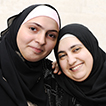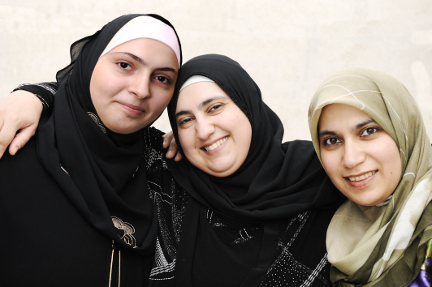Start a Disciple-Making Movement Among Your Muslim Neighbors

Both the Qur‘an and Islamic tradition erect barriers which inhibit Muslims from considering who Jesus is and what He has done for them. Muslims are often taught …
- to think about Mohammed rather than Jesus,
- to fear the corrupting influence of “Christian” culture,
- a misrepresentation of Christian doctrine,
- not to have Christian friends, and
- to believe that the Bible has been corrupted.
Yet when Muslims are lovingly invited past these barriers to study or encounter Isa al-Masih (Jesus the Christ), they are often drawn strongly to Him.
What follows is a compilation of “first step” suggestions toward starting Disciple-Making Movements among your Muslim neighbors,1 distilled from a variety of field practitioners. This provides context for applying the separate articles in this issue of MF on Any-3, and From the Qur‘an to the Bible.
Common Basics
Rely on the Holy Spirit
Ask the Holy Spirit to give you His love for your Muslim neighbors and to reveal His love for them through you. Love casts out fear (1 Jn 4:18).
Bathe your efforts in prayer
Recruit others to pray regularly with and for you. Expect God to
- lead you to “persons of peace” (Lk 10:6),
- confirm His word with miracles (Mt 10:8, Lk 10:9), and
- give you the words to speak as you go in obedience (Mt 10:18–20).
 Seek “Persons of Peace” (POPs)2
Seek “Persons of Peace” (POPs)2
Central to disciple-making movements is focusing your time on fruitful soil.
Use Sowing God’s Kingdom in From the Qur‘an to the Bible (p. 24) or Any-3 (p. 18), or adapt this:
A friend and I are looking for Muslims who love God and would be interested in studying3 the prophets we share through the Holy Scriptures. Do you know someone like that?
Don’t settle just for a few Muslim friends; keep praying and seeking until you are investing primarily “Persons of Peace.”
Variations of Approach
Jesus discipled with bits of truth and let people seek more. After Pentecost the believers often encountered people who believed immediately after hearing the gospel and were discipled more rapidly. Both models are still working today.
Present the gospel first
In Any-3 the gospel presentation “First and Last Sacrifice” (p. 20) is often used as a simple gospel presentation to quickly reveal where the Holy Spirit is working. In this model, discipleship and responding to objections come later. (Any-3 can also be used to identify likely participants for further study together.)
Study the prophets together (p. 25)
Another common approach is to present the gospel only through studying the Bible together.
With Muslims whose community respects the Qur‘an, open the Qur‘an for their reference as you study the Bible together so that they can discover the Bible’s superiority for themselves in a way they can freely reproduce within their community.4
With Muslims who are indifferent or fed up with their religion and looking for something else, just use
the Bible.
And with Muslims who are personally uncomfortable handling religious books, try electronic media or printed excerpts in your discussions.
Finding Muslims
Unless you live among Muslims you may need to go find them. Here are some practical approaches.
 Go with others
Go with others
As God gives you opportunity, tag along with others who have Muslim friends as a way to meet and get comfortable with Muslims.
Once you are comfortable, draw others along to help them get started. Visit halal restaurants, and other places where relaxed conversation can occur. (Use zabihah.com to identify Muslim gathering places in your area.)
Pray and then visit a mosque together (if you sense God’s leading) and try to engage in a personal conversation.
Look for opportunities to befriend or be hospitable to Muslims, and especially to enjoy meals together as a way to deepen relationships.
And when you make a Muslim friend, rejoice at having overcome 1,300 years of conflict!
Cultivate sensitivity to Muslim culture
Start with these:
- Greet Muslims with “As-salam alaykum” (peace be upon you).5
- Expect fruitful conversations to run past midnight.
- Respect religious books by never putting them on the floor or in other “unclean” places.
- Ask Muslim friends to help you be sensitive to their customs.
Relate Spiritually
Clarify your spiritual identity
When asked if you are a Christian, ask what they mean by that word before answering. Here is one response you can adapt when answering the question:
I was born into a nation where many call themselves “Christian.” What I have learned is that God wants me to love and submit to Him by obeying all the commands of Jesus. This is how I seek to live. What would you call me?
 Pray with Muslims for their needs
Pray with Muslims for their needs
Muslims seek God’s blessing, and many are open to receive it through Isa al-Masih. You can help them experience God by offering to pray with them. They may be happy for you to pray with them for God’s blessing, healing, guidance, deliverance and protection.6
Clarify concepts
Confusion often arises from different meanings for shared terms. Ask what your Muslim friend means by such words as “Muslim” and “Christian,” and explain where you mean something different.
Employ discovery
Follow Jesus’ example; lead others to discover and obey truth through stories7 and questions. Consider employing Discovery Bible Study or Bible Storytelling.8
Train Muslims to receive God’s guidance
When Muslims ask your opinion on spiritual matters, teach them to rely on God’s Word and the Holy Spirit rather than you. Ask the Spirit’s guidance to lead them to a relevant Bible story and have them read or listen to the full book for context and to raise additional questions. Then pray together for direct insight from God, asking God to reveal what He wants them to know. Ask them “What did God say?” and “What will you do?” Help them learn to test the spirits and recognize God’s voice through confirmation from His Word for what they receive.
Aim for Multiplication
Seek to bless whole families
As you meet individuals, pray for God to bless their whole family and community. Befriend their whole family with your whole family.
Stay focused
When a Muslim wants to argue their common objections (Son of God, Trinity, etc.), suggest looking together for answers in the Bible. Ask questions and avoid arguing.
If they insist on arguing, listen actively to their heart and the Holy Spirit, validating their feelings: “It sounds like you feel angry about that,” etc. Then suggest meeting again at a later time to study the facts together. The Holy Spirit may work in their heart in the meantime.
Consciously limit your time with those whose only desire is to argue.
Prioritize inclusiveness
Invite your first Muslim friend to bring a friend. Meet in public if they are so inclined. Suggest that they discuss what they are learning with their friends, family and leaders. If they fail to do these things, seek out others who will. Your goal is a discipling movement, not scattered individuals.
Honor parents and authorities
In obedience to the Scripture, affirm parents and others in authority rather than sowing disrespect. This may open opportunities for sharing directly with those in authority.
Multiply groups
When Muslims want to bring others to an established study after the second meeting, decline to disrupt this group and offer instead to help them start a new study with their friend, family, or even religious leaders.
Keep Improving
Continue learning from other laborers
Meet regularly with other local Christians to
- learn from each others’ successes,
- identify hindrances to fruitfulness, and
- pray for your Muslim friends.
Take advantage of the excellent resources and training which are increasingly available.9
Trust the Holy Spirit
Don’t dictate:
- what believers should call themselves,
- what religious observances they should embrace or reject, and
- what gatherings they should or shouldn’t attend.
Instead, train new believers to seek and receive the Holy Spirit’s guidance by studying His Word with other followers of Isa al-Masih.
Conclusion
God is at work in unprecedented ways to fulfill His promise to Abraham: “I will surely bless [Ishmael]” (Gen. 17:20).
Yet 1.6 billion Muslims live with a mixture of truth and error, awaiting the movement of God’s Spirit to lead them on a “Straight Path” into His kingdom.
God has brought Muslims to your doorstep.
Will you seek the Holy Spirit’s guidance and empowering to participate in opening the door for Disciple-Making Movements among them?
For additional introductory materials, visit http://www.thekingdomconversation.com
Golden Retriever Missiology
By Carl Medearis
Zoe is our 8 year old female Golden Retriever. She’s amazing. Smart. Obedient. Personal. And … everyone loves her.
I’ll come back to my dog in a moment.
I’ve noticed an interesting phenomenon among some missionaries to Muslims in my 30 years in that vineyard; a self-fulfilling prophecy. With variations, it goes like this: Muslim soil is hard. It takes years of building relationships before we can effectively share the good news. They are sometimes antagonistic to the gospel, and many Muslim majority countries do not like us and what we do. Church planting is difficult, dangerous and down-right daunting (the Three D’s of Muslim missions).
I went to Yemen as a 20-year old with YWAM in 1983. I met a wonderful man—the head of a large mission who ran a hospital there. He and his wife were having their retirement party—returning to the USA after 22 years of faithful service. I was so excited to meet a real, live missionary to Arab Muslims. I burst out with the obvious (or so it seemed) question. With great anticipation and enthusiasm I asked, “So how many Muslims have come to Christ?”
They were so sweet. No guile. No pretense. While looking intently at his wife to be sure she agreed, the man answered, “Well, son. I think maybe two. Actually depends how you count … two or three.” And, as wives sometimes do with us over-exaggerating husbands, she gently chided him saying “Honey, I’d say one for sure and maybe two.” And they looked like they were okay with that.
I tried to smile, but couldn’t. I didn’t know what to say, or even what to think.
I had been told many times over—that Arab Muslims were “difficult” and not to expect too much fruit. And this seemed to confirm that: After 22 years, 1, 2 or maybe 3 Arab Muslims following Jesus. There you have it.
I know the verses. The way is narrow. A camel going through the eye of a needle. The parable of the soil—only one in four seeds seem to make it. The odds are not in our favor. Few will be chosen. And it seems like Muslims are the fewest of the few.
We have theology to back up our experience: this task is difficult.
Or …
My Golden Retriever. Which comes first—people all like my dog because she is inherently friendly; or, my dog is so friendly because everyone likes her.
Do you see the difference? Zoe doesn’t believe in “strangers.” Everyone is her best friend. She never stops to think, “Hmmm, I wonder if that guy over there is a dog person?” She thinks everyone’s a “dog person.” She gets confused when someone doesn’t lean over and pet her while making silly human noises.
And so … everyone does like her. They say things like “You have the nicest dog,” or “Are all Golden Retrievers this friendly?”
Zoe loves people, and people love her. Which came first? I think it’s my dog’s assumption that every person in the world will love her—and then they do. This is also a self-fulfilling prophecy.
And that’s my experience with Arab Muslims and Jesus. I’ve met tens of thousands over 30 years, in nearly every Arabic speaking nation. From Al Azhar in Cairo, the Imams of Saudi Arabia, to the Hezbollah of southern Lebanon to the Hamas of Palestine—Arabs respond positively to me—and to our message of Jesus the Messiah. In every instance. 100% of the time. Okay, once a guy got angry at me, so 99.9% of the time.
Why is that? Because I assume they will like me, and more importantly, I assume they will want to hear the message of Jesus. And then … they do.
For every verse that sounds like Jesus is hard to get to, I can show you five that are the opposite. They’re inviting. Open. Easy. Remember James’ end-point in Acts 15? “Let’s make it easy on the Gentiles to come in.” Maybe WE are the ones making it hard on Muslims to see and believe in and follow Jesus.
The crowds loved Jesus. They followed him en masse. They wanted to make him king. Children came to him—and kids know who’s right on and who’s messed up. Kids only like adults who like them.
When I assume someone wants to know me, and wants to hear what I have to say—they do. This is not positive thinking. It’s not a method. It’s “faith.” Jesus loves Muslims. I love what and who Jesus loves. So I love Muslims. And when I love them—they love me back. We form a bond of trust—they give me access to their heart, and I share with them the best news they’ll ever hear.
It really is that simple!









comments